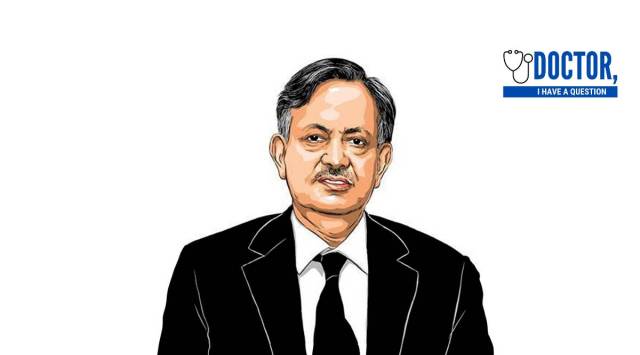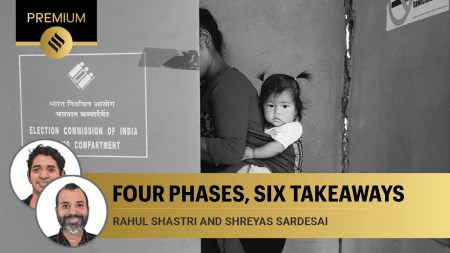- India
- International
‘India too may have acute hepatitis cases… Child specialists must stay alert’
Over the last three weeks, several cases of acute hepatitis or liver inflammation of unknown origin have been reported among children in the US and Europe. At least 17 of them needed a liver transplant and one died of the disease as per the World Health Organization. Dr SHIV KUMAR SARIN speaks to ANONNA DUTT about how the disease is different from the usual hepatitis, the possible reasons for its spread among children, and preventive measures that parents can take.
 Dr Shiv Kumar Sarin, vice-chancellor, Institute of Liver and Biliary Sciences, New Delhi
Dr Shiv Kumar Sarin, vice-chancellor, Institute of Liver and Biliary Sciences, New DelhiWhy Dr Sarin: Dr Shiv Kumar Sarin is the vice-chancellor of the Institute of Liver and Biliary Sciences, a stand-alone government hospital dedicated to the treatment and research of liver diseases. He has helped develop 17 major treatment guidelines for gastric and liver diseases. His team helped establish that the ‘mother to baby route’ was a major route for transmission of Hepatitis B in the country. He was also instrumental in the launch of the Hepatitis-B vaccination programme in India. He has received the Padma Bhushan and the Shanti Swarup Bhatnagar Prize, one of the highest multidisciplinary science awards in India.
How is this illness different from common hepatitis?
Acute hepatitis is the inflammation of the liver, measured by levels of an enzyme called SGPT that is released when the liver is damaged. When SGPT levels are more than 10 times the normal upper limit, a person is said to have hepatitis, whether it is with or without jaundice (a condition where the skin and the white of the eye turn yellow). Acute hepatitis is like fever. It can be caused due to several reasons, but it is most commonly due to Hepatitis A, B, C, D, or E infection.
In the current string of cases, the children did not have any of the hepatitis viruses. There are some other viruses – such as Epstein Barr, herpes simplex, parvovirus, and cytomegalovirus – which we usually test for if a patient does not have Hepatitis A to E. I know that the biopsies of these children are currently being studied to look for the less-common viruses, but for now it is thought to be caused by an adenovirus that was found in the samples of some 70 of these children.
Adenovirus is very common and usually causes upper-respiratory tract symptoms such as cold, sore throat and fever. It hardly ever leads to hepatitis; certainly not in healthy children. But some of the children with the current illness needed liver transplants!
The virus aside, the symptoms in these cases are also slightly different. The children first had diarrhoea, then developed lethargy, nausea and vomiting. The usual hepatitis cases do not come in with diarrhoea; they usually complain of nausea, abdominal pain and loss of appetite.

It also seems to be affecting children under the age of five more than others and they are the ones who seem to be developing severe disease. The common hepatitis A infection usually does not affect this age group because they get antibodies from the mother.
If children have been getting adenovirus infection for years, why is it that they are developing acute hepatitis because of it?
Adenovirus infection is one of the probable causes, but we do not know anything for sure at the moment. Adenovirus is not hepatotropic, that is it does not directly affect the liver. So, why is it doing so now?
One of the possible theories being examined is the low level of transmission during the pandemic because of Covid-19 prevention measures. The children did not interact much with each other and subsequently did not get the common viral infection. They did not have immunity to the virus and so the infections now are leading to severe disease.
Another possible explanation is bystander hepatitis, which happens when a person is repeatedly exposed to an infection. When the first infection happens, the T-cells of our immune system get primed for it, circulate through the body and then settle in the liver. The next time the infection happens, the T-cells think that the pathogen will affect the liver and they damage the liver trying to protect it. This is seen in malaria.
The other question is whether a Sars-CoV-2 infection has a role here because a few of the affected children had it. After the lungs, it is the bile duct where the virus goes. And since it multiplies there, it might cause damage to the liver. But we have not seen this so far in the pandemic. Since it is happening after the pandemic, lower immunity after a Covid-19 infection could be making the children susceptible to other infections.
But these are all hypotheses, we do not know anything for sure.
Most of the cases have been reported from the United Kingdom and European countries that used the Oxford-AstraZeneca vaccine, where an adenovirus is used to deliver the Covid-19 spike protein to the body? Could that be the cause of the mysterious liver disease?
Cases have also been reported from the US (which does not use the Oxford-AstraZeneca vaccine). The hypothesis was looked into but it has not been proven as most of the children did not receive the vaccine.
Could the illness also spread in India?
It might. There might already be cases in India which we have not picked up. Now that WHO has raised an alarm, child specialists should be aware of the illness and start notifying any case of hepatitis not found to be positive for Hepatitis A to E. If such cases are detected, thorough investigation has to be done.
What are the precautions that children and their parents need to take?
First of all, we need to understand that this is not a common occurrence and that there is no need to panic. Parents should follow all steps needed to protect children from hepatitis and other viruses. Make sure the children wash hands frequently, especially before and after a meal, make sure they cover up while coughing or sneezing, eat hygienic food, etc. Also, since diarrhoea is the first symptom that is being reported in the acute cases, parents should not send their children to school if such a situation arises.
Send your questions at kaunain.sheriff@expressindia.com
May 18: Latest News
- 01
- 02
- 03
- 04
- 05



































